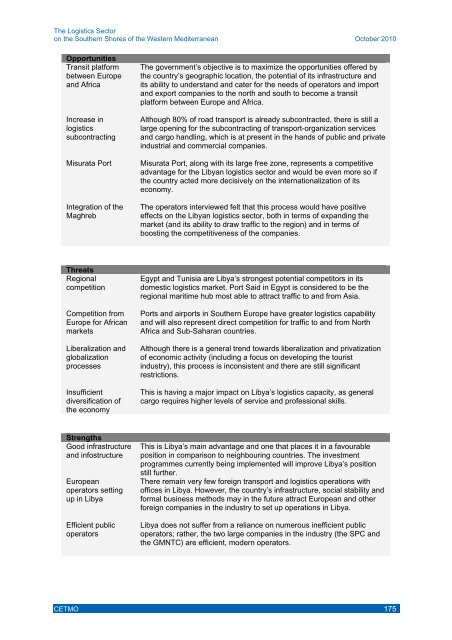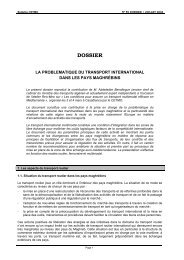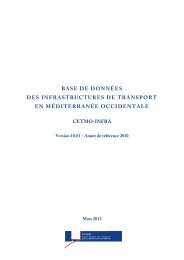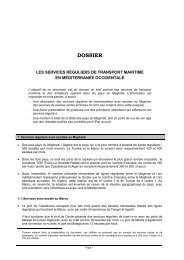October 2010<str<strong>on</strong>g>The</str<strong>on</strong>g> <str<strong>on</strong>g>Logistics</str<strong>on</strong>g> <str<strong>on</strong>g>Sector</str<strong>on</strong>g><strong>on</strong> <strong>the</strong> Sou<strong>the</strong>rn <strong>Shores</strong> <strong>of</strong> <strong>the</strong> <strong>Western</strong> MediterraneanPrise en compte et priorisati<strong>on</strong> des demandes des opérateurs et facilitati<strong>on</strong> de lacollaborati<strong>on</strong> entre l’Administrati<strong>on</strong> et le secteur privéComme nous l’av<strong>on</strong>s souligné précédemment, la c<strong>on</strong>naissance que nous av<strong>on</strong>s acquise dela réalité du secteur, et plus encore de la faç<strong>on</strong> d<strong>on</strong>t les chefs d'entreprises f<strong>on</strong>t leur métierau quotidien, nous c<strong>on</strong>duisent à recommander de prendre en compte et d'accorder la prioritéà leurs principales demandes telles que :Faciliter le regroupement en associati<strong>on</strong>s pr<strong>of</strong>essi<strong>on</strong>nelles, tant au sein d’une même pr<strong>of</strong>essi<strong>on</strong> qu’àun niveau pluridisciplinaire (par exemple les communautés portuaires). Cet aspect est jugéimportant pour c<strong>on</strong>solider les points de vue et les soluti<strong>on</strong>s, et pour fédérer les entreprises autourd’objectifs communs et d’une même vol<strong>on</strong>té de progrès. La facilitati<strong>on</strong> du dialogue avec leministère des Transports est également un argument en faveur des associati<strong>on</strong>s pr<strong>of</strong>essi<strong>on</strong>nelles.Améliorer la gesti<strong>on</strong> entrepreneuriale, notamment en matière de gesti<strong>on</strong> des entrepôts, des platesformeset des chaînes logistiques, et de marketing.Apporter un soutien aux entreprises du secteur dans le domaine des technologies de l’informati<strong>on</strong> etde la communicati<strong>on</strong>. Créer des bourses de fret pour faciliter la commercialisati<strong>on</strong> et organiser plusefficacement les transports.Favoriser le recours à une assistance technique extérieure au travers de stages, de missi<strong>on</strong>s, decampagnes d’e-learning, etc. pour une mise à jour des c<strong>on</strong>naissances dans le domaine des servicesferroviaires, du transport routier, du secteur portuaire, de l’évaluati<strong>on</strong> des coûts externes et de lagesti<strong>on</strong> logistique.Développer le partenariat entre les entreprises locales et des entreprises étrangères. Cela est jugénécessaire pour le transfert du savoir-faire, car la capacité logistique endogène est très réduite.Simplifier le cadre réglementaire et c<strong>on</strong>trôler sa mise en applicati<strong>on</strong> effective. Accélérer lesprocédures. Compléter le cadre réglementaire en créant les statuts manquants, en particulier celuid’opérateur logistique.Améliorer les équipements de transport. Ne se pas limiter à créer des plates-formes logistiques,mais créer également des z<strong>on</strong>es de stati<strong>on</strong>nement pour les cami<strong>on</strong>s et des z<strong>on</strong>es de stockage à l’airlibre (pour le transport en c<strong>on</strong>vois excepti<strong>on</strong>nels et le stockage de c<strong>on</strong>teneurs).Favoriser une culture de gesti<strong>on</strong> des coûts de la part des opérateurs. En premier lieu, fournir desinformati<strong>on</strong>s sur les coûts grâce à des initiatives telles que les observatoires des coûts, desprogrammes d’évaluati<strong>on</strong> des coûts, etc.Lier financement et formati<strong>on</strong> : ces deux aides doivent être fournies simultanément pour que lesentreprises puissent acheter des équipements et accroître leurs compétences.Favoriser une visi<strong>on</strong> partagée de la modernisati<strong>on</strong> : les ports de la rive nord et ceux de la rive suddevraient progresser en parallèle, car du point de vue de la chaîne logistique, cela n’a pas de sensd’être très efficace d’un côté et très peu de l'autre.Propositi<strong>on</strong>s communes à tous les pays (voir 4.1) et étude de leur mise en applicati<strong>on</strong>dans chacun d’entre eux, ainsi que des possibilités qu’elles <strong>of</strong>frent en termes derenforcement de la coopérati<strong>on</strong> maghrébine et méditerranéenne.Voir les propositi<strong>on</strong>s communes du paragraphe 4.1.4.3 Libya4.3.1 <str<strong>on</strong>g>The</str<strong>on</strong>g> <str<strong>on</strong>g>Logistics</str<strong>on</strong>g> <str<strong>on</strong>g>Sector</str<strong>on</strong>g> in Libya: C<strong>on</strong>clusi<strong>on</strong>s Drawn From <strong>the</strong> AnalysisFrom <strong>the</strong> perspective <strong>of</strong> <strong>the</strong>ir impact <strong>on</strong> <strong>the</strong> operators, <strong>the</strong> main external trends and factors(opportunities and threats) and internal trends and factors (strengths and weaknesses) in <strong>the</strong>logistics industry to take into c<strong>on</strong>siderati<strong>on</strong> are <strong>the</strong> following:174 CETMO
<str<strong>on</strong>g>The</str<strong>on</strong>g> <str<strong>on</strong>g>Logistics</str<strong>on</strong>g> <str<strong>on</strong>g>Sector</str<strong>on</strong>g><strong>on</strong> <strong>the</strong> Sou<strong>the</strong>rn <strong>Shores</strong> <strong>of</strong> <strong>the</strong> <strong>Western</strong> Mediterranean October 2010OpportunitiesTransit platformbetween Europeand AfricaIncrease inlogisticssubc<strong>on</strong>tractingMisurata PortIntegrati<strong>on</strong> <strong>of</strong> <strong>the</strong>Maghreb<str<strong>on</strong>g>The</str<strong>on</strong>g> government’s objective is to maximize <strong>the</strong> opportunities <strong>of</strong>fered by<strong>the</strong> country’s geographic locati<strong>on</strong>, <strong>the</strong> potential <strong>of</strong> its infrastructure andits ability to understand and cater for <strong>the</strong> needs <strong>of</strong> operators and importand export companies to <strong>the</strong> north and south to become a transitplatform between Europe and Africa.Although 80% <strong>of</strong> road transport is already subc<strong>on</strong>tracted, <strong>the</strong>re is still alarge opening for <strong>the</strong> subc<strong>on</strong>tracting <strong>of</strong> transport-organizati<strong>on</strong> servicesand cargo handling, which is at present in <strong>the</strong> hands <strong>of</strong> public and privateindustrial and commercial companies.Misurata Port, al<strong>on</strong>g with its large free z<strong>on</strong>e, represents a competitiveadvantage for <strong>the</strong> Libyan logistics sector and would be even more so if<strong>the</strong> country acted more decisively <strong>on</strong> <strong>the</strong> internati<strong>on</strong>alizati<strong>on</strong> <strong>of</strong> itsec<strong>on</strong>omy.<str<strong>on</strong>g>The</str<strong>on</strong>g> operators interviewed felt that this process would have positiveeffects <strong>on</strong> <strong>the</strong> Libyan logistics sector, both in terms <strong>of</strong> expanding <strong>the</strong>market (and its ability to draw traffic to <strong>the</strong> regi<strong>on</strong>) and in terms <strong>of</strong>boosting <strong>the</strong> competitiveness <strong>of</strong> <strong>the</strong> companies.ThreatsRegi<strong>on</strong>alcompetiti<strong>on</strong>Competiti<strong>on</strong> fromEurope for AfricanmarketsLiberalizati<strong>on</strong> andglobalizati<strong>on</strong>processesInsufficientdiversificati<strong>on</strong> <strong>of</strong><strong>the</strong> ec<strong>on</strong>omyEgypt and Tunisia are Libya’s str<strong>on</strong>gest potential competitors in itsdomestic logistics market. Port Said in Egypt is c<strong>on</strong>sidered to be <strong>the</strong>regi<strong>on</strong>al maritime hub most able to attract traffic to and from Asia.Ports and airports in Sou<strong>the</strong>rn Europe have greater logistics capabilityand will also represent direct competiti<strong>on</strong> for traffic to and from NorthAfrica and Sub-Saharan countries.Although <strong>the</strong>re is a general trend towards liberalizati<strong>on</strong> and privatizati<strong>on</strong><strong>of</strong> ec<strong>on</strong>omic activity (including a focus <strong>on</strong> developing <strong>the</strong> touristindustry), this process is inc<strong>on</strong>sistent and <strong>the</strong>re are still significantrestricti<strong>on</strong>s.This is having a major impact <strong>on</strong> Libya’s logistics capacity, as generalcargo requires higher levels <strong>of</strong> service and pr<strong>of</strong>essi<strong>on</strong>al skills.StrengthsGood infrastructureand infostructureEuropeanoperators settingup in LibyaEfficient publicoperatorsThis is Libya’s main advantage and <strong>on</strong>e that places it in a favourablepositi<strong>on</strong> in comparis<strong>on</strong> to neighbouring countries. <str<strong>on</strong>g>The</str<strong>on</strong>g> investmentprogrammes currently being implemented will improve Libya’s positi<strong>on</strong>still fur<strong>the</strong>r.<str<strong>on</strong>g>The</str<strong>on</strong>g>re remain very few foreign transport and logistics operati<strong>on</strong>s with<strong>of</strong>fices in Libya. However, <strong>the</strong> country’s infrastructure, social stability andformal business methods may in <strong>the</strong> future attract European and o<strong>the</strong>rforeign companies in <strong>the</strong> industry to set up operati<strong>on</strong>s in Libya.Libya does not suffer from a reliance <strong>on</strong> numerous inefficient publicoperators; ra<strong>the</strong>r, <strong>the</strong> two large companies in <strong>the</strong> industry (<strong>the</strong> SPC and<strong>the</strong> GMNTC) are efficient, modern operators.CETMO 175
- Page 1:
The Logist
- Page 4 and 5:
Study financed byEuropean Comission
- Page 6 and 7:
October 2010The <s
- Page 8 and 9:
October 2010The <s
- Page 10 and 11:
October 2010The <s
- Page 12 and 13:
October 2010The <s
- Page 14 and 15:
October 2010The <s
- Page 16 and 17:
October 2010The <s
- Page 18 and 19:
October 2010The <s
- Page 20 and 21:
October 2010The <s
- Page 22 and 23:
October 2010The <s
- Page 24 and 25:
October 2010The <s
- Page 26 and 27:
October 2010The <s
- Page 28 and 29:
October 2010The <s
- Page 30 and 31:
October 2010The <s
- Page 32 and 33:
October 2010The <s
- Page 34 and 35:
October 2010The <s
- Page 36 and 37:
October 2010The <s
- Page 38 and 39:
October 2010The <s
- Page 40 and 41:
October 2010The <s
- Page 42 and 43:
October 2010The <s
- Page 44 and 45:
October 2010The <s
- Page 46 and 47:
October 2010The <s
- Page 48 and 49:
October 2010The <s
- Page 50 and 51:
October 2010The <s
- Page 52 and 53:
October 2010The <s
- Page 54 and 55:
October 2010The <s
- Page 56 and 57:
October 2010The <s
- Page 58 and 59:
October 2010The <s
- Page 60 and 61:
October 2010The <s
- Page 62 and 63:
October 2010The <s
- Page 64 and 65:
October 2010The <s
- Page 66 and 67:
October 2010The <s
- Page 68 and 69:
October 2010The <s
- Page 70 and 71:
October 2010The <s
- Page 72 and 73:
October 2010The <s
- Page 74 and 75:
October 2010The <s
- Page 76 and 77:
October 2010The <s
- Page 78 and 79:
October 2010The <s
- Page 80 and 81:
October 2010The <s
- Page 82 and 83:
October 2010The <s
- Page 84 and 85:
October 2010The <s
- Page 86 and 87:
October 2010The <s
- Page 88 and 89:
October 2010The <s
- Page 90 and 91:
October 2010The <s
- Page 92 and 93:
October 2010The <s
- Page 94 and 95:
October 2010The <s
- Page 96 and 97:
October 2010The <s
- Page 98 and 99:
October 2010The <s
- Page 100 and 101:
October 2010The <s
- Page 102 and 103:
October 2010The <s
- Page 104 and 105:
October 2010The <s
- Page 106 and 107:
October 2010The <s
- Page 108 and 109:
October 2010The <s
- Page 110 and 111:
October 2010The <s
- Page 112 and 113:
October 2010The <s
- Page 114 and 115:
October 2010The <s
- Page 116 and 117:
October 2010The <s
- Page 118 and 119:
October 2010The <s
- Page 120 and 121:
October 2010The <s
- Page 122 and 123:
October 2010The <s
- Page 124 and 125:
October 2010The <s
- Page 126 and 127:
October 2010The <s
- Page 128 and 129:
October 2010maghrébineSynthèse<st
- Page 130 and 131:
October 2010The <s
- Page 132 and 133: October 2010The <s
- Page 134 and 135: October 2010The <s
- Page 136 and 137: October 2010The <s
- Page 138 and 139: October 2010The <s
- Page 140 and 141: October 2010The <s
- Page 142 and 143: October 2010The <s
- Page 144 and 145: October 2010The <s
- Page 146 and 147: October 2010The <s
- Page 148 and 149: October 2010The <s
- Page 150 and 151: October 2010The <s
- Page 152 and 153: October 2010The <s
- Page 154 and 155: October 2010The <s
- Page 156 and 157: October 2010The <s
- Page 158 and 159: October 2010The <s
- Page 160 and 161: October 2010The <s
- Page 162 and 163: October 2010The <s
- Page 164 and 165: October 2010The <s
- Page 166 and 167: October 2010The <s
- Page 168 and 169: October 2010The <s
- Page 170 and 171: October 2010The <s
- Page 172 and 173: October 2010The <s
- Page 174 and 175: October 2010Favourable FactorsReinf
- Page 176 and 177: October 2010The <s
- Page 178 and 179: October 2010The <s
- Page 180 and 181: October 2010Essor des relationsavec
- Page 184 and 185: October 2010WeaknessesNo strategy f
- Page 186 and 187: October 2010The <s
- Page 188 and 189: October 2010The <s
- Page 190 and 191: October 2010Accroissement durôle d
- Page 192 and 193: October 2010The <s
- Page 194 and 195: October 2010The <s
- Page 196 and 197: October 2010The <s
- Page 198 and 199: October 2010The <s
- Page 200 and 201: October 2010The <s
- Page 202: October 2010The <s
















